- Home
- Jacqueline Wilson
Opal Plumstead Page 2
Opal Plumstead Read online
Page 2
‘What?’ I did think her fat, but I knew I couldn’t say so. ‘Of course not, you loopy girl. You’re just . . . comfortable.’
‘Mother says I’m getting very tubby,’ said Olivia. ‘She’s bought me this awful corset for Sundays. It’s unbelievably uncomfortable. I can barely talk when I’ve got it on. It flattens my tum a bit, but I bulge out above and below it in a totally disgusting way. I couldn’t even move after I’d tucked into my roast beef and Yorkshire pudding. Does your mother make you wear a corset for best, Opal?’
‘I’ve got nothing to push up or push down,’ I said, peering at my flat chest and sighing. ‘My mother keeps on berating me as if I’m being wilfully defiant in not growing bosoms, just because Cassie had a figure when she was fourteen.’
‘Does Cassie wear a corset?’ Olivia asked.
‘Yes, but it’s not one of those really fierce ones. It hasn’t got proper bones.’ I’d secretly tried it on, but it just looked ridiculous on me and I hated the cloying smell of Cassie on it, of powder and musk.
‘Mother says I should be mindful of my figure now. She’s stopped letting me have second helps of anything. She’s so mean.’
‘I’d swap her for my mother any day,’ I said.
‘Why do mothers have to be so difficult?’ said Olivia. ‘I shall be so lovely to my children. I shall let them eat their favourite meals every single day, always with second helps, and I’ll buy my little girl an entire family of dolls and my boy will have a toy fort with a battalion of little lead soldiers. I will play with them all day long while the cook makes our meals in the kitchen and the maid does all the housework.’
‘I hope you will let your servants have their favourite meals and give them second helps too,’ I said.
I had been to tea with Olivia and observed her family’s single servant, a skinny little mite with untidy hair tumbling out of her cap and dark circles like bruises under her eyes. I’d talked to her, asking her name and age and when she had left school as she served us lopsided sandwiches and little scones like stones. She had blinked nervously and mumbled her replies.
‘I’m Jane, miss, and I’m thirteen years old, and I only went to school when I was small, miss, because I had to help Ma at home with the little ones.’
I was shocked to discover that Jane was younger than us. I wanted to find out more about her, but Olivia’s mother was frowning at both of us. Poor Jane’s hands started to tremble. She very nearly dropped a plate of bread and butter and poured half the tea onto the tablecloth. She murmured a desperate apology and fled the room.
‘Oh dear,’ said Olivia’s mother. ‘We’ve unsettled her.’ She raised her eyebrows and said to me in a tone of gentle reproof, ‘We don’t usually ask personal questions of servants, Opal – at least, not when they’re performing their duties.’
I felt my cheeks burn. I was terrified that Jane might be punished, all because of me. It seemed such a heartless rule. It was as if they weren’t acknowledging that Jane was a girl, just like Olivia and me – and yet the whole family made a huge fuss of their two smelly spaniels, chatting to them in baby talk, rolling them over on their backs and petting them in a hugely embarrassing way.
Olivia had put her arm round me when we were ushered off to play cribbage in the parlour.
‘Don’t take too much notice of Mother – she can be very stuffy,’ she whispered. ‘And she’s really very kind to Jane. She’s training her carefully and she hardly ever gets cross when she makes mistakes.’
I wondered what it would feel like to be Jane. I knew I didn’t want to be a teacher – but I certainly didn’t want to be a servant, either.
‘Oh Lordy, there are only three toffee chews left,’ said Olivia now.
‘You have them. They’re your sweets, after all,’ I said, though I hoped she wouldn’t take me seriously.
‘No, no, fair dos,’ said Olivia. She gave me one – banana flavour! – and popped a strawberry chew in her own mouth. Then she bit hard into the remaining toffee.
‘Careful! Mind your front teeth. You won’t get that husband of yours if you’ve got a great gap in your mouth,’ I said. ‘Here, let me.’
I had a go at severing the sticky toffee and was more successful than Olivia. We both chewed happily.
‘What about your husband?’ asked Olivia. ‘What will he be like?’
‘Oh, I don’t think I want one,’ I said.
‘You have to have a husband!’
‘No I don’t. I don’t think it would be congenial at all, having to flap around after a man. I’m not very keen on men, anyway,’ I said airily, trying to sound sophisticated.
‘Wait until you fall in love,’ said Olivia, grinning.
‘I don’t believe in falling in love,’ I told her. ‘I don’t believe in love itself. I think it’s just a comfort story for adults. Children get to believe in fairies and Father Christmas – adults believe there’s one true person out there. Your eyes meet, and that’s it, you’re in love.’
‘But it’s true. Of course you fall in love!’ said Olivia. ‘Look at Romeo and Juliet. See, even your boring old Shakespeare believed in true love.’
We were studying Shakespeare at school, but in the silly bowdlerized version considered suitable for young ladies. I’d taken a proper volume of Shakespeare’s tragedies out of the library and had learned many passages by heart because I thought they were so beautiful. I’d chanted them at Olivia when I wanted to annoy her.
‘Shakespeare was writing poetically. Romeo and Juliet is beautiful because of the words. It’s ridiculous as a plot. It takes place over a matter of days – in which they’re supposed to fall in love so passionately that they risk everything and then die for each other,’ I said scornfully.
‘You don’t think it’s like that for real people?’ asked Olivia.
‘No, I don’t.’
‘So why do so many people have sweethearts?’
‘Because the young men desire the young women,’ I said grandly, though I couldn’t stop myself blushing.
I had very little clear idea what sweethearts did when that desire was consummated. Neither did Olivia. I knew that because we’d whispered and giggled over the conundrum many times. We both got the giggles now, choking over the last of our toffee chews.
‘But there’s more to love than that,’ Olivia gasped at last. ‘Haven’t you ever felt all swoony over someone?’
‘No!’
‘Not Mr Andrews?’ Olivia suggested slyly, smoothing out our sweet wrappers.
He was our music teacher, and he was tall and dark. He told us stories about all the tormented composers and played us extracts from their work on his Edison phonograph. I did like Mr Andrews very much.
‘Go on! I bet you’d like to kiss Mr Andrews,’ said Olivia.
That set us giggling again.
‘Certainly not! Think how that moustache would tickle,’ I said. ‘Anyway, Mr Andrews has got a wife – I’ve seen her – and he seems very fond of her.’
‘There! Husbands and wives love each other, silly,’ said Olivia, twisting each toffee paper round her little finger, turning them into tiny glasses.
‘They’re fond at first – that’s the passion. But it wears off. Think of our parents, Olivia – your mother and father and mine.’
We thought.
Olivia sighed, looking depressed. ‘Well, I’ll love my babies, even if I don’t always love my husband,’ she said. ‘Let’s drink to that.’ She gave me a toffee-wrapper glass and we touched them together and pretended to drink. Then Olivia consulted her pocket watch. ‘Cripes, look at the time! We’re going to be in trouble.’
We stood up and ran helter-skelter out of the graveyard, all the way to our respective homes.
I LIVED IN a house called Primrose Villa. It was a pretty name, but our home was small and stark, one of ninety-eight built in bright red brick in an ugly terrace. We didn’t have any primroses in our garden – just a dusty privet hedge, a square of grass, and some puny rose bushes at th
e front. We had no garden at all at the back, just a bleak yard with a washing line and an outdoor WC. The word ‘villa’ implies a large, spacious house, but ours was the opposite. It had a meagre front parlour, a living room and kitchen downstairs, and two bedrooms and a box room upstairs.
Mother and Father had the bedroom at the front, Cassie had the room at the back, and I had the box room. It wasn’t much bigger than a cupboard, but I didn’t mind. It was my room, where I kept all my books and could nail my own choice of pictures on the walls. Mother favoured sentimental reproductions of children with fat cheeks and soulful expressions cuddling bug-eyed rabbits. I had reproductions of proper art in my room – soulful Madonnas in glorious cobalt blue cradling pale little Infants.
When I was nine or ten, I went through a fervently religious phase and decided I wanted to be a nun. I used to unhook the dark curtain from the parlour and parade around in my ‘nun’s habit’, chanting psalms and doing my best to look holy. I had grown out of that phase now and tended to think religion a myth – though I still prayed when I felt despairing.
I longed for a proper desk in my room but it was too cramped. My bed and washstand and wardrobe nudged each other uncomfortably as it was. When I painted or did my homework, I had to sit bolt upright on my bed and balance a tray on my lap to make a flat surface. Once absorbed in my work I often relaxed, with disastrous consequences. The tray tilted and my water jar or inkpot spilled. Mother was furious. She couldn’t get the ink stains out, no matter how many times she laundered the sheets.
‘Well, you’ll just have to sleep in black sheets, you careless little missy. We can’t afford to get you any new ones,’ she hissed at me.
I didn’t care. I’d have liked a black coverlet too, and maybe black wallpaper and a black painted ceiling. I liked the décor of deep mourning. Now that I was in my teens I’d developed a taste for Gothic literature and devoured Dracula and Frankenstein.
I sat down now, balancing the tray across my knees as best I could. I concentrated hard for an hour, doing two pages of algebra and an English comprehension. Then, for a second hour, I painted. I used sepia tones for extra effect, painting the graveyard. I drew the stone angels flying away from their plinths while skinny corpses crept out of their graves and gambolled in the grass.
I heard Mother calling for me intermittently but ignored her as long as possible.
‘Opal!’ she cried, bursting into my room. ‘What’s the matter with you?’
‘Sorry, Mother, were you calling?’ I said, trying to look innocent.
‘You heard me, young lady!’
‘I was engrossed in my painting.’
‘What are you doing painting? What about your homework?’
‘I’ve done it all – see,’ I said, gesturing at my notebooks.
‘Then you can come downstairs and help me make supper.’
‘I don’t think I want any supper today,’ I said, truthfully enough, because the surfeit of toffee chews had made me feel a little queasy.
‘Oh, that’s so typical of you, only thinking of yourself. What about the rest of us? What sort of a daughter are you?’
‘Can’t Cassie peel the potatoes for once?’
‘Poor Cassie’s fingers are sore from stitching. She’s done an honest day’s work at Madame Alouette’s.’
Cassie was an ‘improver’ at an expensive hat shop in town. It said it specialized in the Finest Parisian Millinery in curly writing on the shop sign – but none of the staff had ever set foot in Paris. Mother always pronounced Madame Alouette’s name with proud emphasis, her tongue waggling, but Cassie told me that Madame only bothered to speak with a French accent in front of clients. Behind the scenes she was plain Alice Higgins from Walthamstow, though she was still as sharp as her own scissors if any of the staff gave her any cheek.
She was rarely sharp with Cassie, who was her favourite apprentice. She sometimes let her model new hats to show them off to clients.
When I stamped reluctantly downstairs to the kitchen, Cassie was wearing silk flowers in her hair. They were deep purple with embroidered crimson centres and dark green leaves. They looked quite wonderful twined through her long red-gold hair.
‘What do you think you are – a bridesmaid?’ I said, pushing past her to the sink.
‘Our Cassie will be a bride, not a bridesmaid,’ said Mother. ‘You look a picture, dear. Did Madame Alouette give you them?’
‘They were left-over trimmings from some old dame’s titfer,’ said Cassie carelessly. ‘Do you think they suit me, Opal?’
I rolled my eyes at her.
‘I’ll give you a couple if you like,’ she said, smiling.
We both knew perfectly well that the flowers would look ridiculous stuck in my limp mousy locks.
‘Oh yes, I’ll twine them all round my specs. Then I’ll look a picture too,’ I said grimly, starting to peel the potatoes.
‘Now now, no need to take that tone. Your sister’s only trying to be kind,’ said Mother. ‘And watch those potatoes – you’re peeling half the goodness away. Don’t they teach you anything useful at that fancy school of yours? They fill your head with all sorts of silly ideas – they’d be far better training you up to be a decent little housewife.’
‘I’m not going to be a housewife,’ I said through gritted teeth.
‘Well, you’re certainly going to find it hard to catch a man with that sour look on your face,’ said Mother. ‘Don’t you go filling your mind with daft daydreams, Opal. You don’t want to end up like your father, do you?’
As if on cue, we heard Father’s key in the lock of the front door. We listened to him shuffle into the hall, pause to hang his hat and coat on the hook, and then trail his way into the kitchen.
‘Hello, my girls,’ he said softly.
He looked exhausted, with dark circles under his bloodshot eyes, his face sickly pale. His economy paper collar had somehow come unbuttoned at the back and stuck out at a rakish angle. His old business suit was a size too big for him now, and drooped unbecomingly. He stood unfastening his boots, blinking in the gaslight.
‘Hello, Father,’ I said.
‘Hey, Pa,’ said Cassie.
Mother didn’t greet him at all. She just tapped the large fat envelope on the corner of the kitchen dresser.
‘Your post, Ernest,’ she said, sniffing. ‘Your chick’s come home to roost again.’
I hated the way she said it. And I hated the way Father picked up the heavy envelope, held it to his chest for a moment, and then walked slowly out of the kitchen. We heard him trudge upstairs to the bedroom.
‘Don’t stay up there half the night brooding,’ Mother called. ‘Your supper will be on the table in half an hour.’
Mother and Cassie shook their heads at each other.
I glared at them. ‘Why do you have to be so hateful to him?’ I said fiercely.
‘Now then, don’t take that tone with me,’ said Mother. ‘Can’t you show a little respect?’
‘That’s precisely my point. You’re failing to show Father any respect whatsoever,’ I said.
‘I’ll thank you to mind your own business,’ said Mother. ‘You think you know it all, Miss Clever-clogs, don’t you?’
I felt I did know it all. I knew Father was a very clever man, much cleverer than me. He’d won a scholarship when he was a boy, taken his Higher Oxford exams and gone to the university. That was when he met Mother. Her parents owned a little stationer’s supplying all the young gentleman scholars. She was only sixteen and I suppose she looked very fetching. It’s difficult to imagine this, because now Mother is frankly stout, so tightly corseted she creaks when she moves, and her bright hair has faded to pepper and salt, scragged back into a tight bun that exposes the lines on her forehead. Even so, I can see that when she was a girl she might have had her fair share of Cassie’s charm.
There was a courtship and then a hasty marriage, disapproved of by both sets of parents. Cassie and I had never met any of our grandparents. Father
didn’t get to finish his degree. He had to go and teach in an elementary school, which he hated. He had been a silent, scholarly child. He couldn’t understand these rough rowdy pupils. He couldn’t control them at all. It made him so ill that he had to stop work altogether for a while.
He started writing when he was lying in bed at home – first tortured confessional pieces, and then fiction, though this was frequently autobiographical. He also wrote children’s stories for Cassie and me. They were melancholy moral tales about little children who misbehave once and consequently suffer terrible disasters and death. Cassie didn’t like these tales and put her hands over her ears and chanted la-la-la so she couldn’t hear. I couldn’t get enough of them, and begged Father to tell me the tale of the boy who ran into the road and got trampled to death by horses, or the story of the little girl who went paddling in a stream and fell into deep water and drowned.
‘Stop telling the children such morbid nonsense!’ Mother said, whenever she overheard.
Perhaps she’d thought the world of Father once, when he was a varsity man and seemed to have prospects. She was full of resentment now. It seemed so unfair, because he was always the sweetest man with the mildest manner, even when she shouted at him. He tried very hard to sell his stories, but without any success so far.
He took a position as a clerk in a shipping office in London. He bent over his desk nine hours a day, entering information in a big ledger, to try to clear our debts. He wrote his stories in the evening after supper. He had a large callous on the middle finger of his right hand from all his penmanship, and developed a permanent headache, so that he often held a cold wet cloth to his temples.
I hated to see him so afflicted. At times I couldn’t help wishing that he was an ordinary father, a bouncy red-cheeked shop man like Olivia’s, who always had a chirpy quip and walked with such a spring in his step that his boots tapped out a tune on the pavement. Then I felt guilty and tried even harder to be a sympathetic daughter, though at times I wanted to seize him by the shoulders and give him a serious shaking.
When supper was ready (sweetbreads and onions and mashed potatoes, an unattractive meal that made me shudder), I said I’d fetch Father.

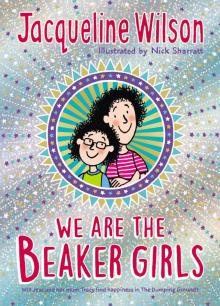 We Are the Beaker Girls
We Are the Beaker Girls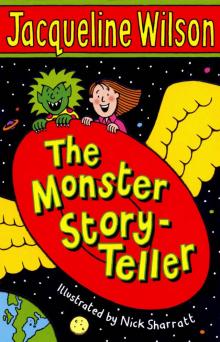 The Monster Story-Teller
The Monster Story-Teller The Worry Website
The Worry Website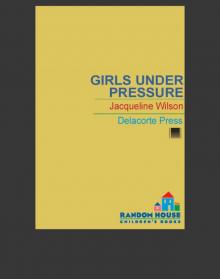 Girls Under Pressure
Girls Under Pressure Little Darlings
Little Darlings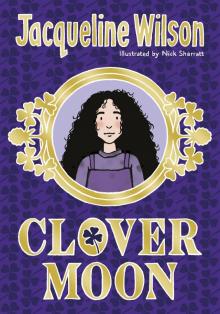 Clover Moon
Clover Moon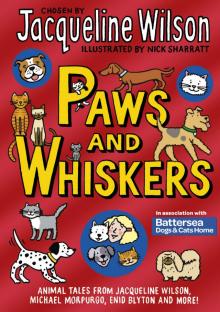 Paws and Whiskers
Paws and Whiskers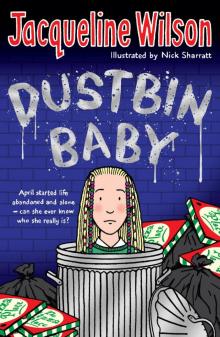 Dustbin Baby
Dustbin Baby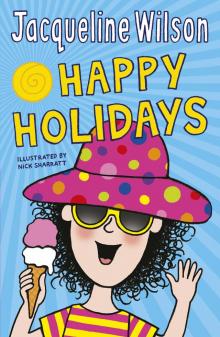 Jacqueline Wilson's Happy Holidays
Jacqueline Wilson's Happy Holidays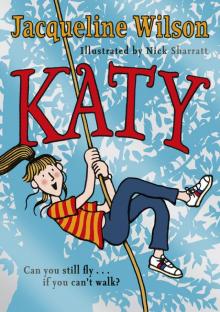 Katy
Katy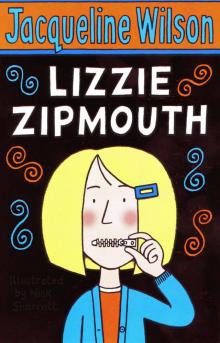 Lizzie Zipmouth
Lizzie Zipmouth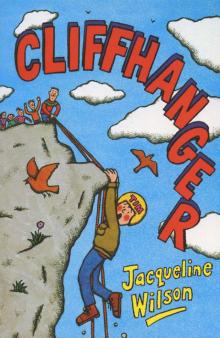 Cliffhanger
Cliffhanger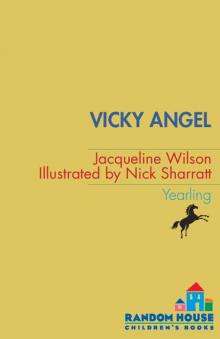 Vicky Angel
Vicky Angel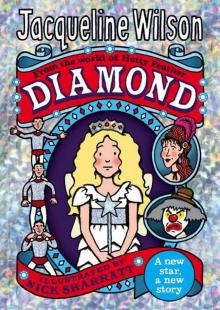 Diamond
Diamond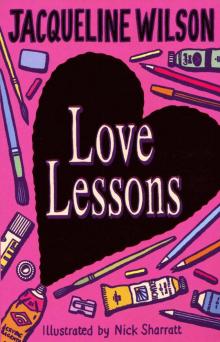 Love Lessons
Love Lessons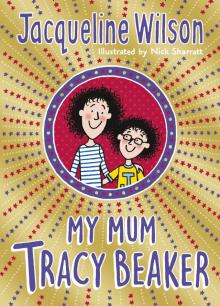 My Mum Tracy Beaker
My Mum Tracy Beaker Lola Rose
Lola Rose Jacky Daydream
Jacky Daydream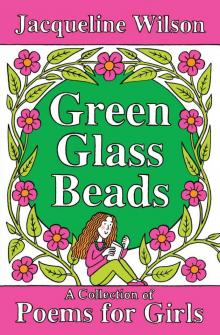 Green Glass Beads
Green Glass Beads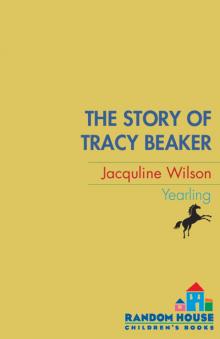 The Story of Tracy Beaker
The Story of Tracy Beaker Clean Break
Clean Break Longest Whale Song
Longest Whale Song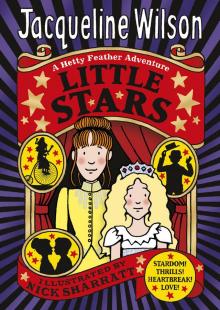 Little Stars
Little Stars Double Act
Double Act The Suitcase Kid
The Suitcase Kid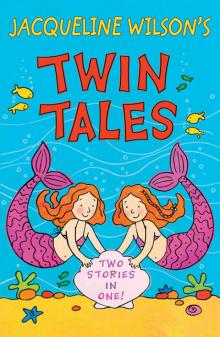 Twin Tales
Twin Tales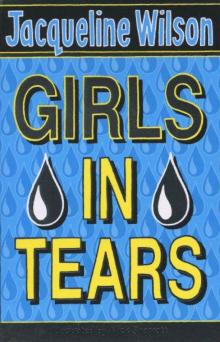 Girls in Tears
Girls in Tears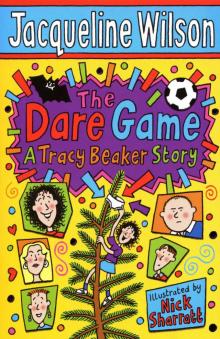 The Dare Game
The Dare Game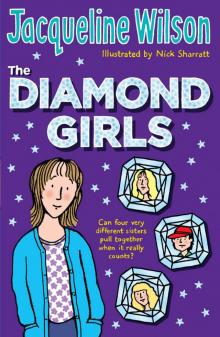 Diamond Girls
Diamond Girls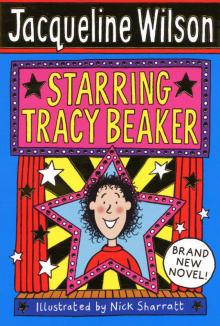 Starring Tracy Beaker
Starring Tracy Beaker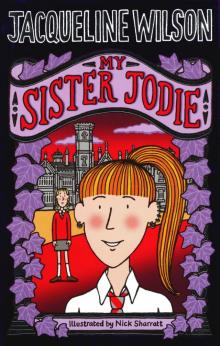 My Sister Jodie
My Sister Jodie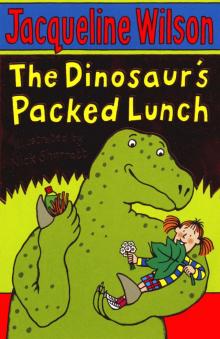 The Dinosaur's Packed Lunch
The Dinosaur's Packed Lunch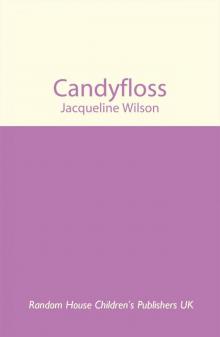 Candyfloss
Candyfloss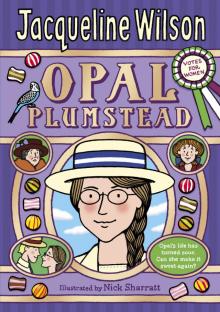 Opal Plumstead
Opal Plumstead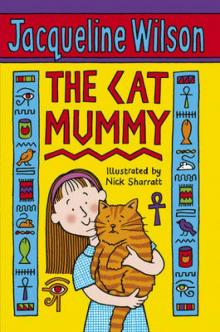 The Cat Mummy
The Cat Mummy Werepuppy and the Werepuppy on Holiday
Werepuppy and the Werepuppy on Holiday Hetty Feather
Hetty Feather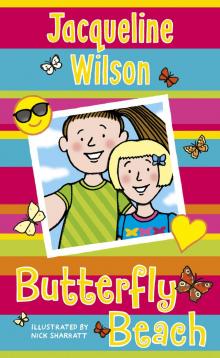 Butterfly Beach
Butterfly Beach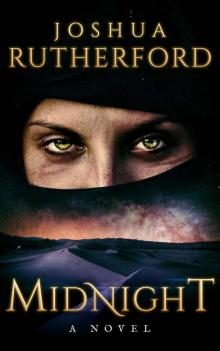 Midnight
Midnight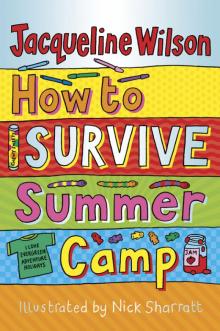 How To Survive Summer Camp (ePub)
How To Survive Summer Camp (ePub) Cookie
Cookie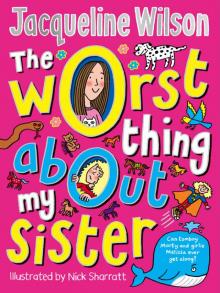 The Worst Thing About My Sister
The Worst Thing About My Sister Bad Girls
Bad Girls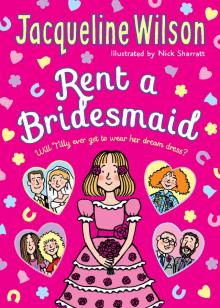 Rent a Bridesmaid
Rent a Bridesmaid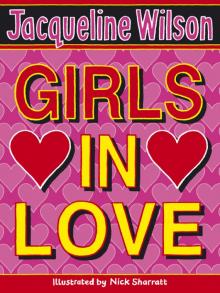 Girls in Love
Girls in Love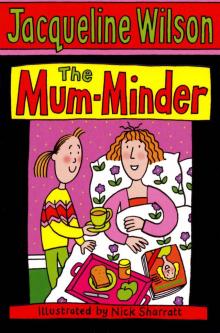 The Mum-Minder
The Mum-Minder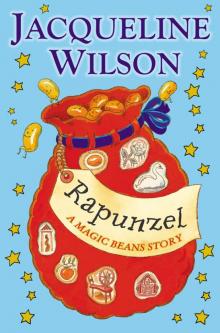 Rapunzel
Rapunzel Lottie Project
Lottie Project Best Friends
Best Friends Video Rose and Mark Spark
Video Rose and Mark Spark Glubbslyme
Glubbslyme Girls Out Late
Girls Out Late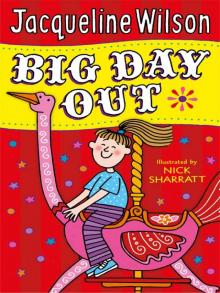 Big Day Out
Big Day Out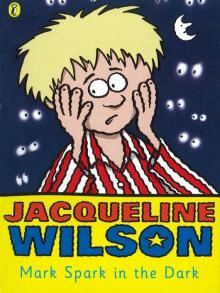 Mark Spark in the Dark
Mark Spark in the Dark Buried Alive!
Buried Alive!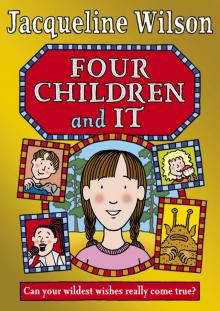 Four Children and It
Four Children and It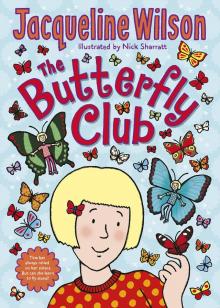 The Butterfly Club
The Butterfly Club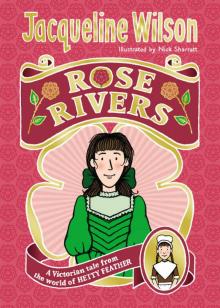 Rose Rivers
Rose Rivers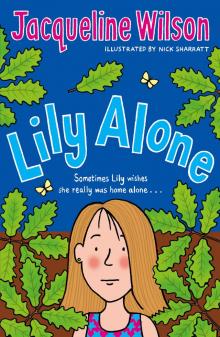 Lily Alone
Lily Alone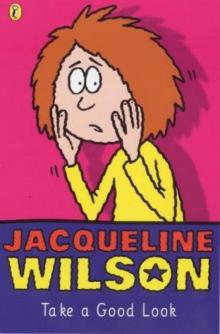 Take a Good Look
Take a Good Look My Secret Diary
My Secret Diary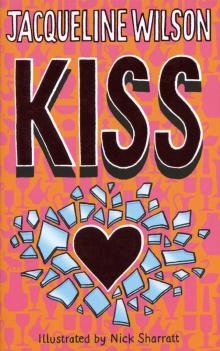 Kiss
Kiss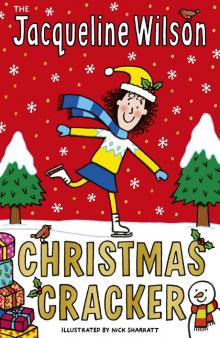 The Jacqueline Wilson Christmas Cracker
The Jacqueline Wilson Christmas Cracker The Worry Web Site
The Worry Web Site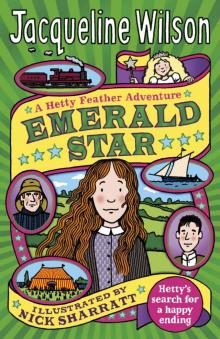 Emerald Star (Hetty Feather)
Emerald Star (Hetty Feather) The Bed and Breakfast Star
The Bed and Breakfast Star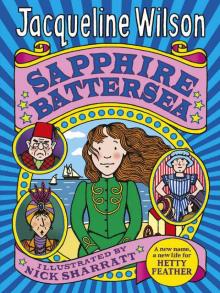 Sapphire Battersea
Sapphire Battersea Cat Mummy
Cat Mummy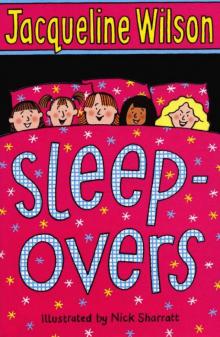 Sleepovers
Sleepovers Dare Game
Dare Game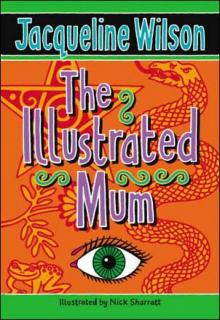 The Illustrated Mum
The Illustrated Mum Secrets
Secrets